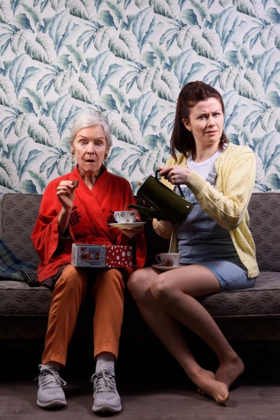Guest Blog: Director Rebecca Loudon On COCKAMAMY

Louise Coulthard began writing Cockamamy while she was living with her grandmother, Alice, who had dementia. The play revolves around Alice and her granddaughter Rosie, and is an examination of the disease and the relationship between a grandparent and grandchild.
I think that what Louise captures so beautifully in Cockamamy is the unique bond that can exist between people across a generation gap. While a relationship between a child and their parent is often fraught with conflict and can at times be extremely combative, the space between the generations leaves room for more tolerance.
The older generation are more patient; the children, less judgmental. In a time when, socially, it feels as though the generation divide is widening and there seems to be less contact, I feel the play serves as an important reminder of the value of these relationships.
Contrary to the usual portrayal of elderly people, Alice is wickedly funny and provocative. Right at the beginning of the play she challenges Rosie about her attitude towards single life - "You look at that Beyoncé, she wrote that song about single ladies and then went back to her husband and left all you girls dancing in a circle".
When she begins to recognise her symptoms of dementia, she boldly confronts Rosie's doctor boyfriend, appealing to him for an honest assessment. Far from burying her head in the sand, she determinedly tackles her fears head on.
The affinity between these two women is so strong that by the end of the play they are devoid of inhibition - we witness the most glorious moments and the absolute worst. Eventually, it becomes clear that Rosie is no longer able to care for Alice. They are too close.
%20Mary%20Rutherford%20and%20Louise%20Coulthard%201.jpg)
There is nothing practical about the way she cares for her grandmother. Every moment of confusion, every blunder, is gut-wrenching and a reminder of the person she's lost. She is living through a bereavement with the ghost of the person she is mourning.
Heartbreakingly, there is no one who can absolve the guilt Rosie feels about her grandmother, except Alice herself.
This was an important play for me to direct because I wanted to explore a story about living with dementia that felt alive and vivid and a celebration of a relationship. When Louise was writing Cockamamy she found that "a lot of art and literature responds to the heartache that this disease brings, however [...] absurdity often brings with it comedy, and Gran's dementia gave birth to so many ludicrous moments.
"I remember her furiously ringing me once exclaiming that Judge Judy wouldn't leave her living room. I explained that Judge Judy was actually in the telly, not her living room, and that all she needed to do was find the television remote to get rid of her. After both having a good giggle there were lots of beeps and I realised she was using the telephone to try to turn the TV off. We were lost in translation again."
To me, Cockamamy is an homage to all the people who have cared for their loved ones. An acknowledgement that this was never something they signed up for. There was no job application and, often, that person is utterly unequipped and unqualified for the role.
Dementia is a heartbreaking way to lose someone, and it's hard to remember a life without recalling those difficult last years. I hope that the play will act as a reminder of the ridiculous, funny and joyful moments, and of the inextricable bond that existed before.
Cockamamy at The Hope Theatre 12-30 June
Photo credit: Alex Brenner
Comments

Videos

